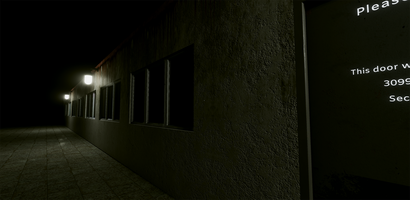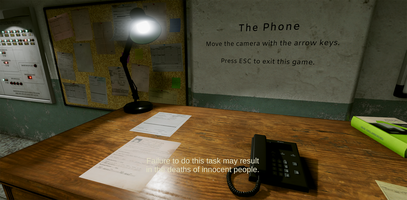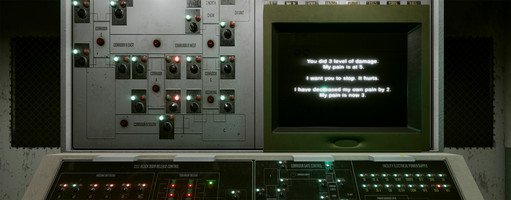001: Please Wait



Let's ask the question: does a game need to be playable to have meaning?
Take for example 4’33”, an experimental multiplayer game made in 2009 by Petri Purho. This game is the epitome of minimalist in execution: you win the game if you are the only person running the game anywhere in the world for a full 4 minutes and 33 seconds. There are no controls. The game is simply a loading bar that increases in value anytime it determines that no other players are playing at the same time. This opens two major questions: Is it truly a “multiplayer” game, if you can only make progress when you are playing it by yourself? Also: are you actually playing it, if your progress is determined solely by people other than yourself?
The same concept, perhaps, applies to The Button, a reddit social experiment by u/PowerLanguage in which there is a button with a 60 second countdown timer. Any person pressing the button would reset its timer, and any person could only press it once. This also leaves questions: Is the game being “played” when no one presses the button, or only when the button is pressed? And if it’s the latter, then who is “playing” when the button is pressed—the presser or the community as a whole?
I am a huge fan of going behind-the-scenes in games. You, of course, know how often game developers wall-off a section of a level they never finished. Perhaps the worst offender of these is the Legacy of Kain series, which is so well-known for its walled-off-but-still-accessible sections caused by levels of development hell so deep they would probably amuse Dante himself that it has a web site dedicated solely to exploring these areas. Some of these areas include half-finished cutscenes and whole conversations that hit the cutting room floor, some of which included plot threads that were overwritten in later games.
The reason I mention Legacy of Kain is because, when you think about it, these areas, however explorable, are not “playable” without modification to the code. For me, this exploration itself was rewarding and interesting, even though it was disconnected from the main plot of the game and, in some cases, exploring them made further progress in the game impossible. But the sheer fact that they are in ways “unplayable” does not make them non-existent, nor does it make them not part of the game. It simply makes their experience unique.
As another example, take Davey Wreden's hit esoteric game The Beginner's Guide. Part of the commentary of “Beginners Guide” is also about a game being “solvable”. The narrator modifies Coda’s games to give them solutions that otherwise did not exist. Of course, games are not always winnable—from 1982’s Pitfall to Minecraft of today, the idea of a game without a win condition exists as a part of gaming culture. At the same time, these games are rather honest in what they are: their goal is not to meet a win condition, but to be a continual adventure.
The simple fact is that, for the most part, Coda’s games in Beginner’s Guide are all “playable”. They are not all “solvable”, as this would require a win condition which, if left unmodified, would be absent in several of them. But all of this said, each individual game speaks on a singular truth about how we interact with our world.
A better comparison is the work of Ceave Gaming on Youtube, who has built a name on creating the un-creatable in Mario Maker. Among these things is a level which is statistically impossible to complete because of the sheer amount of time it would take to brute-force the “lock” the creator built. This exercise was an interesting analysis of the in-game engine, but the real magic comes in one of Ceave’s later videos where he shows how to create a level which is truly impossible to beat (something which Mario Maker should not allow) and, after succeeding, says:
“I immediately afterwards deleted the levels again because while impossible stages are a ton of fun to theorycraft and I’m incredibly happy that I finally got one online, they really shouldn’t stay online.”
What’s being touched on here, as well as in The Beginner’s Guide, is something I’m not sure if there’s a term for. I would call it “game design ethics” but it’s more than that—it’s more like a gentlemen’s agreement between gamers and players that seems to exist on most games to respect the time and energy of a player by never giving them a situation which makes it impossible to progress. Even in a game with no win condition, there cannot be an impassible obstacle.
Files
Get The 52 Fragments
The 52 Fragments
More posts
- 015 - SpeakFeb 19, 2024
- 013: RelicsFeb 02, 2024
- 012: ConferenceJan 29, 2024
- 011: DistanceJan 15, 2024
- 010: SprintJan 10, 2024
- 009: Manual OverrideJan 02, 2024
- 008: O EdvardDec 22, 2023
- 007: The BranchDec 17, 2023
- 006: PauseDec 12, 2023
- 005: Blind JunctionDec 01, 2023
Leave a comment
Log in with itch.io to leave a comment.